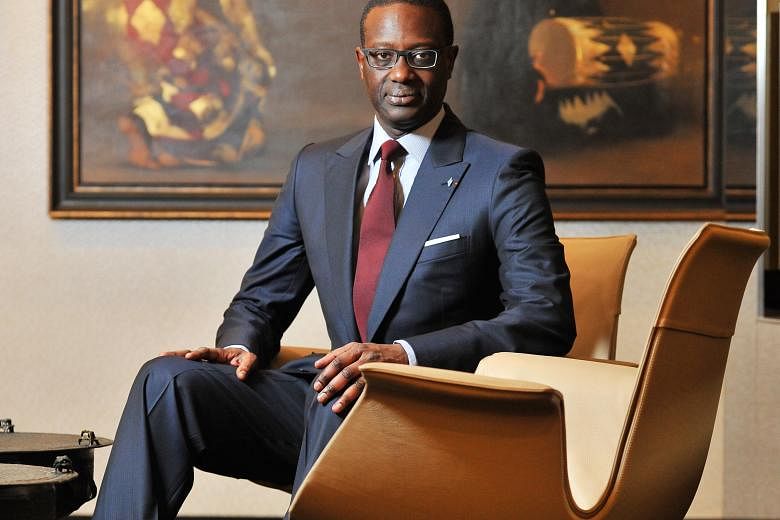As a politician in his native Ivory Coast, Mr Tidjane Thiam once had to live under armed guard after a military coup.
During the restive period that followed, he took a drive without a security detail and was overtaken by a pickup truck loaded with machine- gun-toting rebels. He thought his life was over.
To someone who has lived through all that, the task of shaking up a global bank that is more than 150 years old might not seem so daunting.
So it is no surprise that Mr Thiam is as cool as a cucumber in his role as the global chief executive of Zurich-based Credit Suisse, which he took on in June this year.
His brush with the rebels convinced him to leave politics, and he decided to return to France, where he had studied and worked as a consultant before.
He later joined insurer Aviva in Britain and in 2008 moved to Prudential, first as chief financial officer and then CEO. From there he made the jump to Credit Suisse.
The 53-year-old has been overseeing a major strategic review of the bank since taking over and will give an update on it later this month, alongside Credit Suisse's third-quarter financial results.
He has revealed little thus far about what the review has found and what his plans are for the bank.
In an interview with The Straits Times, Mr Thiam would say only: "I've said that we wanted lower-volatility earnings and less capital-intensive growth and that tells you a lot."
Many finance industry analysts believe this means he will make moves to shrink Credit Suisse's investment banking unit, which is costly to run, and get the bank to focus more on wealth management, especially in growth regions such as the Asia-Pacific.
Mr Thiam hinted as much during a conference call with analysts after revealing Credit Suisse's second-quarter results in July, when he highlighted that the bank's private banking and wealth management business did well, especially in Asia and Switzerland.
"Yes, we want to move towards allocating more capital to that business, and to be more selective about what we do in the investment bank," he had said then, adding that the latter business has come under pressure from stricter rules.
Asia's growing wealth and the transformation of economies across the region make it a very exciting market for Credit Suisse, Mr Thiam told The Straits Times.
"Banks with a strong equity franchise have a key role to play in helping companies to go to their next stage of development, go public, raise debts to fund development and generate economic growth.
"I'm quite keen on that part of the business. We can manage the assets and protect and grow the wealth of individuals, but we can also be an entrepreneur's bank and cover their needs."
Whatever changes he does unveil, he is fully aware that the results will be visible only years from now.
"In the end, we will be judged by what we do and four, five years from now. Frankly, whether the presentation happens in October or December nobody will remember. What will make a difference is the delivery and the quality of our results."
Largely, his appointment as CEO generated surprise and optimism. Credit Suisse shares jumped 20 per cent in the weeks following the announcement of his appointment.
Surprise, because the bank chose not to hire an executive from another bank, but optimism because he led a period of sterling growth at the insurance giant, driven by a strategy focused on Asia.
When asked whether the expectations placed on him gives him added pressure or a boost of confidence, he remarked with his characteristic coolness: "Maybe I've achieved a few things in all those years at previous jobs, but I've never achieved them alone. I've achieved them with people, with teams.
"My constant ambition is to get a team to operate at a very high level of performance, it's not to turn myself into a superstar."
He added: "Generally, with public views, you are rarely as bad as they think you are in bad times and rarely as good as they think you are in good times. The truth is always in the middle."

